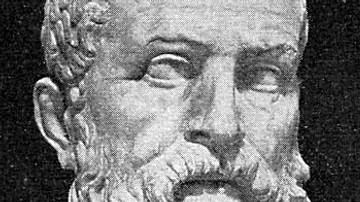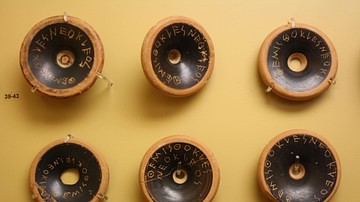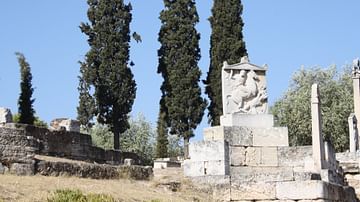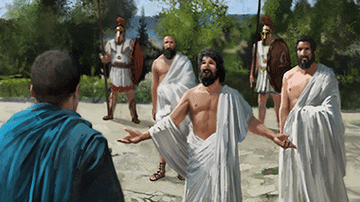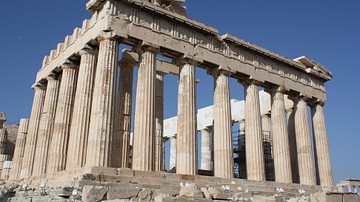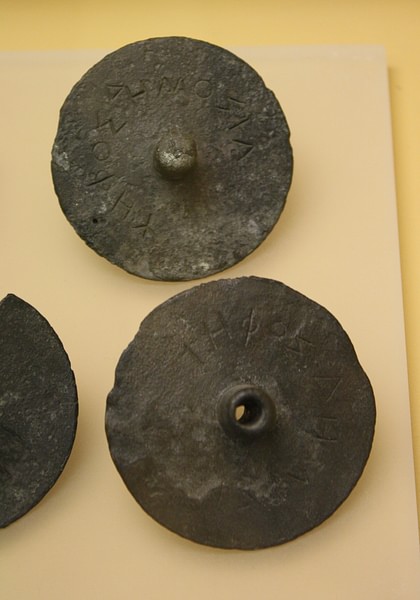
Cleisthenes (b. late 570s BCE) was an Athenian statesman who famously reformed the political structure and processes of Athens at the end of the 6th century BCE and, thereby, greatly increased the influence of ordinary citizens on everyday politics. Accordingly, he is credited with creating a celebrated system of democracy, which, over the following decades, would become ever more direct so that all citizens could actively and directly participate in government.
Early Life
Cleisthenes (also Kleisthenes) was born into the aristocratic Alcmaeonid family of Athens sometime in the late 570s BCE. His father was Megacles, himself a powerful figure in Athenian politics, and his mother, Agariste, was the daughter of Cleisthenes, the tyrant of Sicyon, a city west of Corinth. Cleisthenes first came to political prominence when he was made archon, a high administrative official, in 525 BCE during the reign of the tyrant Hippias. However, when the Alcmaeonid family fell out of favour with the ruling regime Cleisthenes went into exile.
Cleisthenes vs. Isagoras
Whilst in exile, Cleisthenes, claiming support from the sacred oracle at Delphi, convinced Athens' old rival Sparta to remove Hippias. Cleisthenes then returned to Athens and vied for power with his great rival, Isagoras. The latter gained political ground when he was made archon in 508 BCE, but Cleisthenes fought back by proposing a programme of political reforms which would win him popular support amongst the citizenry of Athens. Seeing the danger of this, Isagoras appealed to his ally, the Spartan king Cleomenes, to intervene and remove his rival. The Spartans did send a small force to lay siege to Athens, and Cleisthenes prudently left the city. The Spartans were rebuffed, though, by popular resistance and, when Isagoras and the Spartans withdrew, Cleisthenes was able to return to his home city. There was now no obstacle to Cleisthenes' proposed reforms.
Cleisthenes' Democratic Reforms
The most important element of Cleisthenes' reforms c. 508 BCE was to reorganize the citizen body of Athens. Traditional classifications and kin groups such as the four Ionian tribes were replaced in significance by a new classification where each member of the citizen body (demos) was to belong to one of 139 local units or demoi (demes). Demes, distributed all over Attica, then belonged to one of 30 trittyes, which, in turn, belonged to one of 10 tribes or phylai. Further, the three trittyes which made up a single tribe each had to come from one of three different areas of territorial classification (Coast, Inland, and City) so that it now became much less likely that tribes would act based on geographical and family loyalties.
All political and military groupings would now be based on these new divisions. Any male who registered with their deme automatically became a citizen and so could participate in the new council of 500, the boule, where everyone had an equal right to speak. Cleisthenes' main motivation in these reforms was probably to reduce the influence of traditional groups and allow himself and the Alcmaeonids more freedom of political maneuver in a more stable political system. He had realized that stability would only come if the political base was broadened to include more citizens and as Herodotus stated, "By adding the people to his side, he gained the upper hand by far over his political opponents (5.69)."
For the ordinary citizens (that is males only) the reforms would allow them to, at least in theory, access institutions and power previously reserved for the traditional aristocratic families. In this sense, and although perhaps not fully realized yet in practice, Cleisthenes established democracy in Athens and prepared the way for further reforms over the next decades which would create a fully and direct democratic system of government in which all citizens could participate. Solon had made all citizens equal before the law and reduced the influence of the landed Athenian aristocracy in the previous century, but in Classical Athens it was Cleisthenes who was credited with being the true founding father of Athenian democracy.
Another reform which is highly likely to have been instigated by Cleisthenes was the political procedure of ostracism whereby the citizen body could vote in a public assembly to exile any person thought to be dangerous or too powerful for the city's welfare. Although not used that often over the next century, the process, and especially the threat of it, was, nevertheless, the greatest example of how ordinary citizens could directly curtail the career of over-ambitious, corrupt, or simply inept politicians. Nothing, unfortunately, is recorded of Cleisthenes' later life after his reforms but they, at least, have ensured his lasting reputation as one of the earliest rulers to promote democracy and the ideal that government should rest with the many rather than the few.
